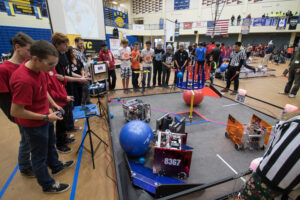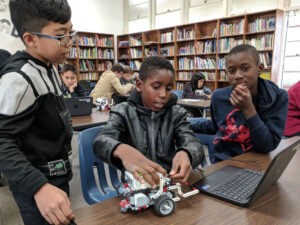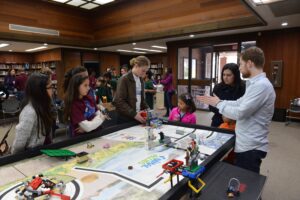Skills that Empower
From the Pacific Union Recorder – April 2018
 Ionic educational philosopher John Dewey wrote, “Education is not preparation for life; education is life itself.” While we may nod along in easy agreement with this precept and those like it—“Young people aren’t the future of the church, they are the church”—most of us recognize that we are simultaneously living in the present and preparing for the future all the time. This is true for adults no matter what stage of life they are in, and it is certainly true for children. Kids in Adventist schools are experiencing life, but they are also always preparing mentally, emotionally, and physically for the next steps: high school, college, career, family.
Ionic educational philosopher John Dewey wrote, “Education is not preparation for life; education is life itself.” While we may nod along in easy agreement with this precept and those like it—“Young people aren’t the future of the church, they are the church”—most of us recognize that we are simultaneously living in the present and preparing for the future all the time. This is true for adults no matter what stage of life they are in, and it is certainly true for children. Kids in Adventist schools are experiencing life, but they are also always preparing mentally, emotionally, and physically for the next steps: high school, college, career, family.
Society is changing at a pace that can feel exhilarating and disorienting at the same time. Heraclitus observed that “Nothing endures but change.” While Adventists would like counter this with the assertion that God also endures, most of us would con-cede the point generally. We live in a world that requires new skills, attitudes, and adaptations almost continually. Education—both pub-lic and private—has been scram-bling over recent decades to find ways to make sure students are adequately prepared for the challenges of an uncertain future, one in which many of the technologies we now rely on will be rendered obsolete. What should children be taught? How early should STEM subjects be introduced?
Mel Wade, technology director at Sacramento Adventist Academy, answers these questions unequivocally. “Kids need to be taught coding at every level,” he says. “Starting in kindergarten.” And not just coding either. Wade, who has degrees in elementary education and curriculum instruction is a strong advocate for science, technology, engineering, and math, particularly in elementary schools where these are often set aside in favor of literacy-related pursuits. Many elementary-level teachers are language arts specialists, and while literacy is obviously a crucial element in the classroom, it is important that teachers also incorporate hands-on science activities. “I’ve always had a passion for technology,” Wade says. “I want to make it fun for kids—energetic, exciting! I’ve always been crazy enough to jump in and figure things out as I go. The kids and I learn from mistakes and figure out what to do next.”
 The Adventist Robotics League, of which Sacramento Academy is a member, partners with FIRST (For Inspiration and Recognition of Science and Technology), an organization founded in 1989 by Dean Kamen, inventor of the Segway and the LUKE arm and a strong advocate for STEM. Every student at Sacramento Academy in grades 1 to 8 does robotics, and it is an elective in high school with a small team of about 14 kids. “We want to keep the team small at this level,” Wade says. “It’s a tremendous amount of work.”
The Adventist Robotics League, of which Sacramento Academy is a member, partners with FIRST (For Inspiration and Recognition of Science and Technology), an organization founded in 1989 by Dean Kamen, inventor of the Segway and the LUKE arm and a strong advocate for STEM. Every student at Sacramento Academy in grades 1 to 8 does robotics, and it is an elective in high school with a small team of about 14 kids. “We want to keep the team small at this level,” Wade says. “It’s a tremendous amount of work.”
The work is paying off. While many Adventist schools are strug-gling to maintain viability, Sacra-mento Academy has increased its enrollment by about 30 students each year over the past two years. There are many reasons for this increase, but the emphasis on robotics has been a contributing factor. “Adventist schools have this philosophy that our unique mission is Christian education, but we need to be competitive academically too,” Wade says. “The public school system takes STEM very seriously. My goal is for any student graduating with an interest in tech or engineering to be comfortable and well-prepared to enter a college program and an eventual career in these fields.”
 One third of the schools in the Pacific Union Conference are involved with robotics, taking advantage of matching grants from the Union to help cover the cost. This intentional preparation for the future is paying off at Sacramento Academy. Its team, Capitals Engineering, just won the Rockwell Collins Innovate Award at the Northern California FIRST Tech Challenge Championship. This award recognizes ingenuity, inventiveness, and out-of-the-box thinking. Wade is quick to note that robotics involves far more than technical skill. “It’s not about the robot. The robot is just a learn-ing tool. Kids learn about all kinds of things—marketing, promotion, teamwork. And their achievements are celebrated just like those of student athletes in many contexts. The difference is that they can realistically go on to use these skills in their careers.” Robert Gouveia, a senior and CEO of the Capitals Engineering team, agrees: “I have refined so many valuable skills such as leadership, team building, contacting and presenting to real world business, and effective com-munication. The dynamics provided through this program allow for these skills to easily develop.”
One third of the schools in the Pacific Union Conference are involved with robotics, taking advantage of matching grants from the Union to help cover the cost. This intentional preparation for the future is paying off at Sacramento Academy. Its team, Capitals Engineering, just won the Rockwell Collins Innovate Award at the Northern California FIRST Tech Challenge Championship. This award recognizes ingenuity, inventiveness, and out-of-the-box thinking. Wade is quick to note that robotics involves far more than technical skill. “It’s not about the robot. The robot is just a learn-ing tool. Kids learn about all kinds of things—marketing, promotion, teamwork. And their achievements are celebrated just like those of student athletes in many contexts. The difference is that they can realistically go on to use these skills in their careers.” Robert Gouveia, a senior and CEO of the Capitals Engineering team, agrees: “I have refined so many valuable skills such as leadership, team building, contacting and presenting to real world business, and effective com-munication. The dynamics provided through this program allow for these skills to easily develop.”
What future are we preparing kids to enter? Eternity, yes. But also a future of opportunities to engage in the messiness of creative problem solving and to make a real difference in the mission fields of corporate America where change is perhaps the only guarantee.
